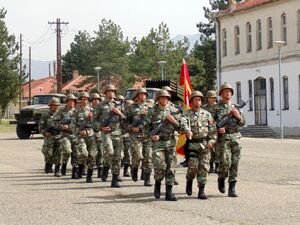| 2016 Macedonian military coup d'état | |||||||
|---|---|---|---|---|---|---|---|
 Soldiers of the 1st Brigade in Skopje |
|||||||
|
|||||||
| Belligerents | |||||||
| Commanders and leaders | |||||||
| Units involved | |||||||
| 1st Mechanized Infantry Brigade "Wolves" Special Operations Battalion | 1st Mechanized Infantry Brigade (some elements) Interior Ministry
|
||||||
| Strength | |||||||
| 3,400 soldiers | 2,000+ soldiers and police | ||||||
| Casualties and losses | |||||||
| 4 killed, 16 wounded | 6 killed, 18 wounded | ||||||
A military coup occurred in the Republic of Macedonia on 28 April 2016, a culmination of the mass anti-government protests that had begun earlier that month, resulting in the overthrow of President Gjorge Ivanov and his government. The coup was executed by a group of hardline military officers in the Army of the Republic of Macedonia, led by Lieutenant General Vladimir Petrovski. The militarist faction took advantage of the government's weak position to seize power and declare martial law in the country.
The group of officers was supported by most of the 1st Mechanized Infantry Brigade the "Wolves" special forces unit. Although the government was defended by elements of the Army and by police units, Skopje, the capital, was fully secured by the mutinous forces within three hours. Petrovski declared himself the new President of Macedonia, while Ivanov, the interim Prime Minister Emil Dimitriev, and a number of other politicians were placed under house arrest. The opposition leader and organizer of the protests, Zoran Zaev, was also arrested, since he was considered a possible rival by Petrovski.
Background[]
Unrest in the small Balkan country began in 2014, after opposition leader Zoran Zaev (head of the party Social Democratic Union of Macedonia) claimed that the parliamentary elections which occurred that year had been rigged. Mass protests began in Skopje in May 2015, when Zaev released documents alleging that the government's state security service wiretapped the phones of twenty thousand people, including journalists and politicians. The government of Prime Minister Nikola Gruevski denied the allegations, but thousands continued to protest. The European Union and the United States brokered an agreement between the opposition and the government, which included holding early elections and Gruevski stepping down from office in January 2016 (which he did, replaced by interim PM Emil Dimitriev). Another one of the conditions was the formation of a special prosecutor's office that would look into the alleged violations of the law by the Gruevski government.
However, on 12 April 2016, President Gjorge Ivanov announced that he was pardoning Gruevski and over fifty other politicians that were being investigated by the special prosecutors. Demonstrations began in Skopje the next day, supported by Zaev, with the president's office being vandalized by rioters. Each day until late April, protestors would meet in front of the special prosecutor's office and then march through the capital, occasionally vandalizing some government building. Ivanov declared that he would not change his mind, despite EU and US pressure to do so. At this time, a faction within the Army of the Republic of Macedonia, a group of anti-Western officers led by Lieutenant General Vladimir Petrovski, decided to take advantage of the situation and seize power from the government.
The coup[]
Initial uprising[]
On Saturday, 30 April 2016,
Final skirmishes[]
Aftermath[]
Reactions[]
Domestic[]
International[]
Albania -
Belarus -
Bulgaria -
China -
Czech Republic -
France
Germany -
Greece -
Russia -
Romania -
Serbia -
Ukraine -
United States -
United Kingdom -
